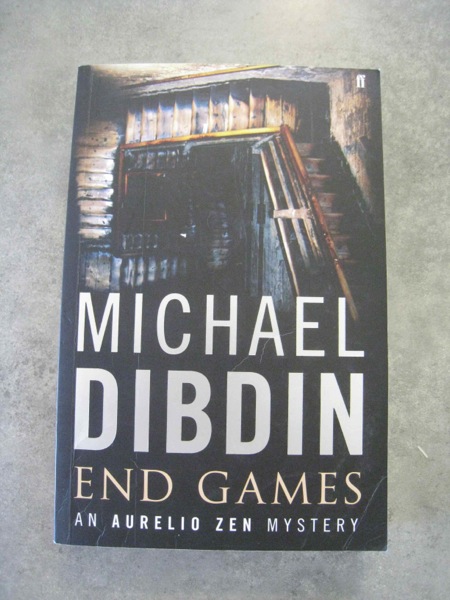Michael Dibdin End Games

End Games, the final Zen book, appeared posthumously in July 2007. Dibdin died after a short illness and while it's possible to speculate where the series might have gone from there, the fact that there hasn't been any suggestion (at least as far as I've noticed) of a partially completed sequel means that End Games may well have been it as far as Aurelio Zen is concerned.
A temporary posting to a remote region of Calabria, right in the toe of the Italian boot (replacing a police chief who's recuperating after shooting himself in the foot) may have been an exercise in filling in time until he can collect his pension, but coincides with the shooting of a Hollywood movie about the apocalyptic battle of Armageddon as envisaged in the Book of Revelations.
The movie, however, is a front for other activities, which provide Dibdin with a chance to have a little fun at the expense of Christian fundamentalists, Italian film directors, American software developers who can't quite distinguish between reality and cyberspace and a mindset that can create an eatery called SooChic, a Japanese-Peruvian fusion place with accents of the Deep South and '50s Scandinavian furnishings.
Until the disappearance of the American lawyer who's involved with the movie, Zen's biggest problem is dealing with the preponderance of the tomato in the local cucina, but when the suspected kidnapping turns into a grisly murder Zen has something solid to sink his teeth into.
On one hand things aren't exactly as they seem. The lawyer has a previously unrevealed Calabrian heritage, and there's a secret search for legendary lost treasure going on in the background, while at the same time the plot line involves age-old conflicts between landowners and peasants, traditional banditry and throws up an extra twist when the lawyer's son appears on the scene and ends up involved with a stunningly attractive policewoman who's involved with tailing the presumed intermediary between the kidnappers and the victim's family.
The result is a wonderful read that leaves you wondering what might have been around the corner for Zen. Dibdin, in the end, has tied things up pretty well, so that while we'd like more there's still the possibility that Zen and Gemma would wind up living quietly in Lucca, Zen retired and Gemma looking after the pharmacy.
That scenario, of course, always gives the potential for something new to intrude on the quiet life, and there are certainly plenty of other regions of Italy where the series hasn't taken the reader.
But, of course, we'll never know.
Given the fact that End Games appeared posthumously, when I was looking around the web before writing this, I noted that many of the reviews of the book also had an element of obituary in them, and there were a couple of summaries of the whole series thrown in there as well.
One of those included some quoted content from Dibdin that explains the origin of the series. He was out to write about a particular theme in Ratking, and Zen was a cipher for the events in the story to happen around.
As such, I'm inclined to see the series as an opportunity to select a number of targets and have a go at them using the peripatetic Zen as a focus for the stories to happen around. Want to have a go at rewriting the Mozart opera? Here's the man to have the action happen around. All you need is to figure a way to get him to where you want him (and the internal dynamics of bureaucratic brouhaha will provide plenty of ways to shift him there) and then sit back and let things flow.
On that basis, a retired Zen could still be called into action. He'd certainly have enough skeletons in the closet to allow the odd one to emerge as an excuse for a new story, and he'd also have the contacts who could call him back to a case that requires his particular skill set, with, perhaps, a get out clause for the authorities in case things go wrong.
But, of course, with Dibdin gone, that's no longer a possibility.
In the end we're left with a wonderful series that really needs to be read (and reread) in sequence so the reader can savour the development of Zen from a character (in Dibdin's words) who comes in and makes it possible for other things to happen to a complex pragmatic antihero who stands out as one of the most intriguing characters I've run across in the world of crime fiction as he deals with the internal politics of a corrupt bureaucracy and the hidden power of the wealthy.
As things stand I've read all the stories twice, and some time down the track knowing how things worked as the series unfolded I've got the opportunity to sit down at some point in the future and reread the lot, just for the sheer enjoyment of some quite wonderful writing.
It's a prospect I'm looking forward to.

